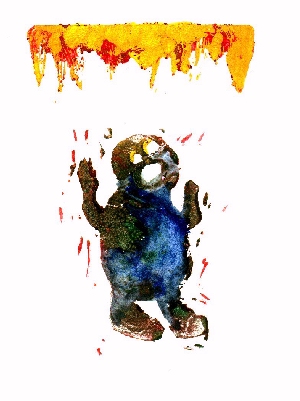
We’re walking to the Avis outlet on 12th Street when Kat makes me cry. We’ve just had dinner, and she’s asked me to walk with her to pick up her rental for the next day. She has errands to run that require lugging around large objects. Soon she’ll be gone for six months, to start a new career, training in Hong Kong and Korea. The new position includes a substantial raise, and much more responsibility. She’s been edgy for days, sleeping only a few hours a night. She’s been unbearable to everyone but me, but tonight, she ruins even my impression of her.
And this is a hard thing to do. She is my oldest friend. We grew up in the same shitty suburb in Illinois, first meeting in pre-algebra class in the seventh grade. My last name ends with an “A”, hers with a “C”; so I was seated right in front of her. We’ve been friends since, for more than fifteen years.
I always rib her: “I remember when you used to wear pastels.”
This stings her more than it might most. She works in fashion, and is always impeccably dressed. In fact, she is beautiful. Tall and slender, with long, naturally blond hair, Kat has a flawless, wholesome complexion; a head-turner, by all accounts.
I am not a head-turner. Get to know me and maybe you’ll want me. But I am not what you would call a conventional beauty, unless Jewish girls with big hips are your thing. I’ve lived in New York City for three years, and haven’t had a relationship longer than two months. I’ve convinced myself that this is fine because I moved here to work, not to fall in love. Most of the time I remember what I have taught myself to think.
And it rarely bothers me that she’s a beauty and I’m not, because when I look at her, I see her whole being, and I know that she sees the same in me. Who cares what those dumb boys think? We have each other.
Tonight, though, she’s something else. I cannot see her whole being, because she’s only showing me one part of it. I didn’t know this part existed, or, perhaps, I denied knowledge because I want to love her and believe she is good. Old friends are not easy to come by, especially in New York City.
She’s talking about leaving her boyfriend, the one who is the best she has ever had. The one before was selfish and abusive. The ones before that partied too much. This is the one who treats her like gold. And he is the one who is poor.
“I’ve been trying for a year to pretend it doesn’t matter that he doesn’t make any money and never will,” she tells me, as we hustle up 14th towards Broadway. “But it does. I could never live with him. After a year you start to wonder what the point is to continue if you know it’s not going to go anywhere.”
“He’s a wonderful man,” I say.
“No one has ever treated me better. I know. But the money matters.”
I try to convince her that it’s not about the money; it’s about the drive.
“You don’t want exactly the same things,” I say.
“No, I’m evil, I know,” she says.
This doesn’t make me cry. It makes me sad. This is what makes me cry:
On 11th, right before University, Kat tells me the story of her botched birthday dinner. Her boyfriend planned on taking her to an upscale restaurant in Soho, only to find that day the restaurant had closed. He scrambled to find another restaurant, but his knowledge is limited. He isn’t the type to dine out; he’s the type to cook in. He finally remembered another spot in the East Village, an excellent vegetarian place. According to his standards, it was a fine place to eat.
Kat didn’t enjoy the meal. The food was average. The wine was cheap. The new dress she had put on that morning was inappropriate to the family-style atmosphere; she was over-dressed on her birthday. She was expecting one thing, and got another.
“And I turned to him in the middle of the meal, and I said, ‘Why did you bring me here?’”
And that’s when I burst into tears. Because I have never had a man take me to dinner on my birthday. Or for that matter, on Valentine’s Day, or, rarely, any other day. Because everything is easy for her and hard for me. Because I didn’t want to feel jealous, but I did. Because I felt sorry for her. Because I felt sorry for him. Because I felt sorry for me.
“I’m sorry,” she whispers. “I knew I shouldn’t have said anything.”
We bid goodbye at the Avis outlet. If she would just listen to me, if she would just let me convince her that she is not the person she thinks she is, everything would be fine. I, of course, will continue to refuse to listen to her.
Jami Attenberg is the author of All This Could Be Yours and numerous other novels.
Illustration by Dinty W. Moore
